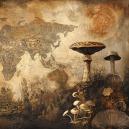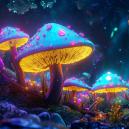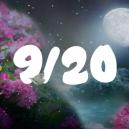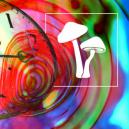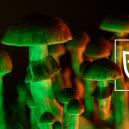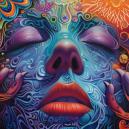What Is The Stoned Ape Theory And Why Does It Matter?
Published :
November 6th, 2019
Categories :
Research

If you’ve ever tried psychedelic mushrooms, you’re likely aware that they can open the mind in a way that’s difficult to achieve in your regular state of consciousness. But have you considered the possibility that shrooms are the reason we evolved into the intellectual species we are today?
That’s exactly what the “stoned ape” theory suggests: that magic mushrooms are what catapulted us from cavemen to Michelangelos; from primates to Einsteins. It’s an interesting idea, and it appears plausible in some respects—but it does have its limitations. So, let’s take a closer look at this theory, and explore the reasons why it may or may not be accurate.
WHAT EXACTLY IS THE STONED APE THEORY?
The idea behind the stoned ape theory is that the evolutionary leap from Homo erectus to Homo sapiens was catalysed by the use of psychedelic mushrooms. It’s a proposed answer to the age-old question of how we evolved from the first upright man to humans with double the brain size—a feat that happened in only 200,000 years, which is basically the snap of a finger from an evolutionary standpoint.
This theory was first brought forth by Terence McKenna in 1992. He was an American ethnobotanist, mystic, psychonaut, author, and advocate for the responsible use of psychoactive plants such as cannabis and magic mushrooms. He was known for his ardent lectures on a myriad of topics, including psychedelic plants and drugs, shamanism, metaphysics, alchemy, language, philosophy, culture, technology, environmentalism, and—perhaps his most famous work—the theoretical origins of human consciousness.
For years, it was considered outlandish and "borderline" by most, but with newfound interest in the healing potential of psilocybin mushrooms, the stoned ape theory has been receiving a lot more attention lately.
McKenna theorised that "magic mushrooms played a pivotal role in the evolution of the species". Mushrooms were believed to sharpen the vision, which would make hunting easier, and they also increased sexual desire, making them more prolific. McKenna also suggested that magic mushrooms had a profound effect on human intellectualism by “stimulating the language portion of the brain and inducing religious experiences that would have opened the path towards behavioural modernity”.
In short, he believes magic mushrooms were an evolutionary catalyst that eventually turned us into the breed of humans we’re familiar with today.
PSYCHEDELICS AND THE HUMAN PSYCHE
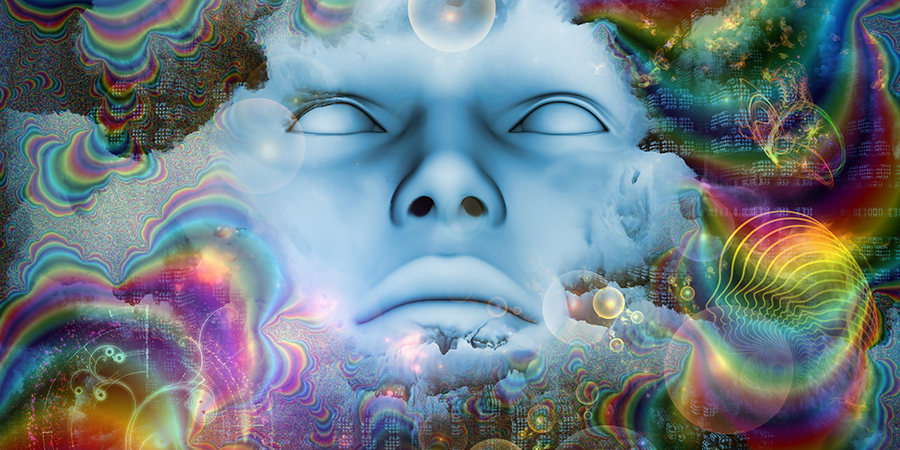
The truth of the matter is, science has not yet caught up with psychedelics, so how they impact the human mind remains a bit of a mystery. Luckily, studies in this field are on the uptick, and it seems that psychedelics diminish activity in the section of the brain called the default mode network. This network regulates our sense of self and how we interpret what’s going on around us. Basically, it controls our deepest sense of being.
As it turns out, psychedelics essentially take that network "offline", which prompts new connections to form in the brain, albeit temporarily. However, these connections can lead to inventions, epiphanies, and the breaking of negative patterns that have been formed in the brain over a longer period of time.
Researchers believe that this can "reboot the brain" so to speak, and many even think it can ultimately bring the user to a "higher state of consciousness" compared to our typical awareness while awake.
Because of this, psychedelics are now being researched for ways to tackle various mental health conditions. Using a method known as "microdosing", people take an extremely small dose of a psychedelic drug—typically psilocybin— for anxiety, depression, PTSD, and other mental health disorders. This small amount is not enough to make anyone hallucinate, but still has some behind-the-scenes effects on the brain.
According to Matthew Johnson, Ph.D., an associate professor of psychiatry and behavioural sciences at Johns Hopkins, “We found drastic reductions [in levels of anxiety and depression] after one high-dose session, and the reductions remained six months later”.
ARGUMENTS AGAINST THE STONED APE THEORY
Naturally, this theory is a bit controversial, and many people have passionate arguments in its opposition. For example, it’s a commonly held belief that McKenna is simply running on assumptions with no evidence to back up his statements.
“Each of his assumptions begs the question: where is the evidence?”, says London-based writer Sam Woolfe. “It also appears that McKenna misrepresented the findings of Fischer and Hill. In their study, what they actually discovered was that psilocybin changes perception, not visual acuity or edge detection—the drug changes how things look, not how clearly they are defined. In fact, in a paper by these two scientists, they remark that the change in perception caused by a ‘low dose of psilocybin may not be conducive’ to the survival of the organism”.
That said, even Mr. Woolfe points out that the study says, “may not be”, which also isn’t definitive. But moving on. Many people also point out that McKenna’s argument that higher doses of psilocybin would lead to “ecstatic, visionary experiences and that would serve as the foundation of religion” has yet to be verified.
The first evidence of religion dates back to European cave art from some 40,000 years ago, which is much more recent than when our brain size doubled. The increase in brain size is believed to have taken place from 2 million to 4 million years ago. However, in such a time span, it’s not unreasonable to believe that even if there was some evidence of religious or mythical beliefs at some point, it could have all disappeared by now.
FINAL THOUGHTS ON THE STONED APE THEORY
So, regardless of what side of the fence you’re on, the stoned ape theory is as interesting as they come. While it’s not rooted in any actual scientific data, it’s certainly intriguing to think that hallucinogenic mushrooms were the catalyst that boosted us into a higher plane of mental awareness and acuity.
But looking forward is always more proactive than looking back, and we’re excited to see what the future holds in terms of psychedelic research, regulation, and societal changes.



